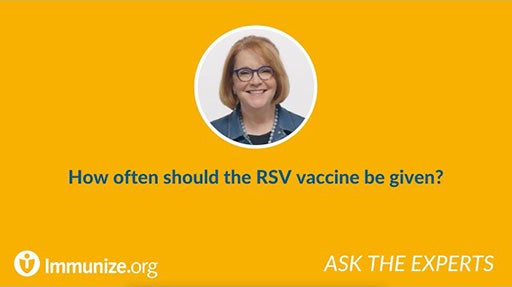- RSV (Respiratory Syncytial Virus)
- Vaccine Products
What are the three RSV vaccines and how are they different?
There are three RSV vaccines licensed and recommended in the United States. Each is listed below, along with their FDA-licensed indications:
- Abrysvo (RSVpreF, Pfizer, originally licensed May 2023): For all adults age 60 years or older, adults age 18 through 59 years with high-risk conditions for severe RSV disease, and during pregnancy from 32 through 36 weeks’ gestation (download the package insert from FDA: www.fda.gov/media/168889/download)
- Arexvy (RSVpreF3, GSK, originally licensed May 2023): For all adults age 60 years or older, adults age 50 through 59 years with high-risk conditions for severe RSV disease (download the package insert from FDA: www.fda.gov/media/167805/download)
- mResvia (mRNA RSV, Moderna, originally licensed May 2024): For all adults age 60 years or older, adults age 18 through 59 years with high-risk conditions for severe RSV disease (download the package insert from FDA: www.fda.gov/media/179005/download)
All three may be used as recommended by CDC and ACIP as a single dose for all adults age 75 years or older and for adults age 50 through 74 years with high-risk conditions for severe RSV disease. Only Abrysvo is licensed for use during pregnancy (during 32 through 36 weeks and 6 days’ gestation) for the prevention of RSV disease in infants.
Arexvy and Abrysvo are recombinant protein vaccines that contain the prefusion form of the F protein found on the surface of the RSV virus. The mResvia mRNA vaccine contains mRNA that encodes the prefusion form of the RSV F glycoprotein. The mRNA vaccine temporarily enables some of the vaccine recipient’s own cells to produce the prefusion form of the RSV F protein, causing the immune system to respond by generating antibodies to it. Because none of these vaccines contain live virus, they cannot cause RSV illness.
The GSK vaccine, Arexvy, includes an AS01adjuvant, a chemical designed to enhance the immune response to vaccination. AS01 is the same adjuvant used in GSK’s recombinant zoster vaccine (Shingrix), but Arexvy contains half the amount of adjuvant as a dose of Shingrix. Abrysvo and mResvia vaccines do not contain an adjuvant.
